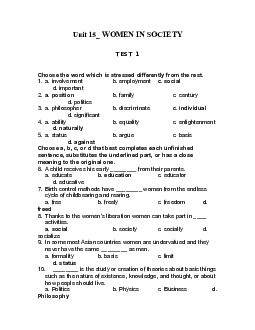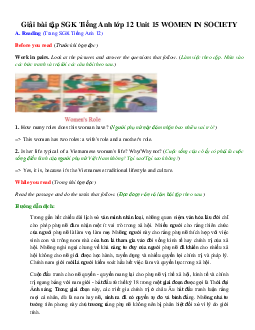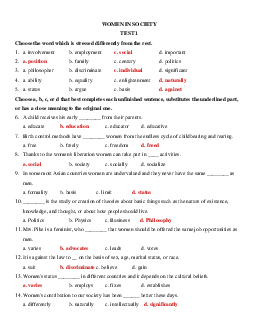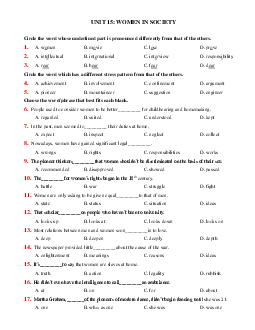






Preview text:
Unit 15_ WOMEN IN SOCIETY TEST 3
Choose the word which is stressed differently from the rest. 1. a. deny b. legal c. women d. limit 2. a. human b. mother c. struggle d. belief 3. a. opportunity b. economic c. society d. intellectual 4. a. history b. natural c. pioneer d. business 5. a. advocate b. consider c. cultural d. period
Choose a, b, c, or d that best completes each unfinished
sentence, substitutes the underlined part, or has a close
meaning to the original one.
6. Western women are more ________ than Asian women. a. depend b. dependent c. independent d. independently
7. In some communities a husband's ________ over his wife is absolute. a. power b. powerful c. powerfully d. powered
8. I think that up to now there has not been a real ________ between men and women. a. equal b. equally c. equality d. equalize
9. Most people consider it women's ________ to take care of children and do housework. a. limit b. relationship c. responsibility d. respect 10.
A ________ problem, feeling, or belief is difficult to change
because its causes have been there for a long time. a. deep-seated b. significant c. dependent d. intellectual 11.
In our modern time, the _______ of women has shifted from homemaker to outside worker. a. role b. period c. right d. pay 12.
Cultural ________ are the commonly held norms and moral
standards of a culture, the standards of right and wrong that set expectations for behavior. a. facts b. changes c. diversities d. beliefs 13.
Women are considered to be better suited for childbearing and
homemaking rather than for involvement in the public life of business or politics. a. education b. advocate c. participation d. recognition 14.
Women's taking part in politics has got widespread objections
from male statesmen in many parts of the world. a. intensive b. extensive c. inside d. slight 15.
Girls must all be sent to school because ________ wil provide better opportunities. a. education b. beliefs c. rights d. politics 16.
In earlier times when the family depended on the hunter for
food, woman's role, because she was gatherer, was secondary. a. a b. an c. the d. Ø 17.
Education is recognized as ________ essential need for
achieving equality in most walks of life. a. a b. an c. the d. Ø 18.
It is estimated that about 640 women remain il iterate in
________ world, mostly in developing countries. a. a b. an c. the d. Ø 19.
It is generally accepted that in today's society women have
access ________ education and can promote themselves much more easily than years ago. a. to b. up c. on d. for 20.
It took women a long time to struggle ________ the right to vote. a. for b. with c. against d. upon 21.
I think women are suited ________ many important things,
besides childbearing and homemaking. a. of b. on c. for d. about 22.
Women are increasingly involved ________ the public life. a. of b. in c. with d. from 23.
If you have an old blanket, ________ it along so that we have
something to sit on at the beach. a. bring b. go c. put d. keep 24.
Although the team was both mentally and physically exhausted, they ________ on walking. a. stopped b. kept c. took d. put 25.
Before the plane ________ off, the flight attendant told
everyone to fasten their seat belts and put their chairs in an upright position. a. woke b. brought c. kept d. took 26.
Don't forget to ________ your gloves on. It is cold outside. a. let b. make c. put d. fix 27.
If you don't pay your rent, your landlord is going to kick you out! a. lend you some money b. play football with you c. give you a kick d. force you to leave 28.
Yesterday I ran into Sam at the grocery store. I had not seen him for years. a. met b. visited c. said goodbye to d. made friends with 29.
Let's go over that report again before we submit it. a. dictate b. print c. read carefully d. type 30.
I wil not stand for your bad attitude any longer. a. like b. tolerate c. mean d. care
Choose A, B, C, or D to complete the following sentences. 31.
Women stil do the majority of the household chores, ________.
a. as their increased participation in the labor market
b. when they participate in the labor market increasingly
c. because they are increasingly participating in the labor market
d. despite their increased participation in the labor market 32.
70-80 percent amount of the total domestic work done by Vietnamese wives ________.
a. regardless of their social status
b. in case they get high social status
c. if they get higher and higher social status
d. that is the reason for their social status 33.
Women spend nearly hours a day on average on housework _______.
a. as much as shopping and childcare
b. together with they go shopping and childcare
c. excluding shopping and childcare
d. and they do shopping and childcare 34.
Nowadays, ________ both single and married women do less
housework than they used to twenty years ago.
a. the more labor-saving devices there are b. labor-saving devices force
c. thanks to labor-saving devices
d. if there were labor-saving devices 35.
In the U.S., women put in additional five hours a week in
housework ________, while marriage does not significantly affect the number of hours men do.
a. once they are married b. since their marriage c. as soon as their married d. if only they are married
Read the passage carefully and choose the correct answer.
It has been thought that women are the second class in citizen,
and men are the first. There is not a real equality of opportunity for
men and women. Years ago, people were living in a man-dominated
society. Women had to obey their husbands and fathers absolutely.
Women's place was in the kitchen and women's work was
housework. In many places, women were not even' al owed to go to
school. Women had no rights, even the right to choose husband for
themselves. Men usually occupied high positions in society so they
thought they were more intelligent than women. Men often
considered women as their property. Sometimes, they were
mistreated by their husbands and suffered the problem as a fate.
Many parents did not even want to daughters.
Despite the progress, there remain outdated beliefs about
women's roles, traditionally passed down from generation to
generation. Men are commonly seen as the strong bodies, bread-
winners in the family and key leaders in society, while women are
restricted to being housewives and child bearing and care, and
housework such as washing and cooking.
According to social surveys, many women in the st century stil
have to work over hours a day including working in offices and doing
countless household chores without any help from their husbands. In
some regions, the labor of women is not recognized despite the
hardships they endure to support the whole family. Moreover, women
are the direct victims of family violence, especially in rural areas.
Thanks to the women's liberation movement, nowadays women
have proved that they are equal to men in every aspect. An average
woman has weaker muscles than an average man but she may be as
intelligent as he is. Women can do everything that men can, and
women can do one thing that no man can: they produce children. 36.
Which is not women's role in the former days?
a. Working in authority b. Doing housework c. Doing cooking
d. Bearing and rearing children 37.
Years ago, women are pot al owed ________. a. to work in the kitchen b. to go to school c. to do housework d. to stay at home with their parents 38. What did women have to suffer? a. Good schooling b. Choosing a husband themselves
c. Enjoy their housework d. Illiteracy 39.
The outdated 'beliefs about women's roles ________.
a. have been eradicated completely
b. disappeared soon after the women's liberation movement c. still exist at present .
d. was forced to change after the women's liberation movement 40.
According to the text, women in the st century ________.
a. do not have to do housework any more
b. are still the victims of family violence in some rural areas
c. get help from their husbands with all housework
d. spend less than hours working outside the home and doing housework
Fill in each numbered blank with one suitable word or phrase.
Years ago, in their private family role, women quite often dominate
the male members of the household. Women were quite (4) _____ to
their families. However, the public role of women has changed (4)
_____ since the beginning of World War II.
During the war, men were away from home to the battle. As a (4)
____, women were in complete control of the home. They found
themselves doing double and sometimes triple (44) _____. They
began to take over the work of their absent husbands and to work
outside. They accounted for 7% of the industrial labor force. Women
were forced by economic realities to work in the factories. The
women who worked there were (45) _____ low wages, lived in
crowded and small dormitories. (46) _____, they found themselves a
place as active members of society. Women, although they were
ruthlessly exploited, became the key to the country's success.
The feminist movement seems to have been (47) _____ important
part in the demands (48) _____ women Equal Rights. The movement
tends to have a way of changing men and women and their roles in
society. It often redefines the role of women in society. Inventions,
too, bring progress in society as (49) _____ as to the individual's life.
In the late nineteenth century the invention of the typewriter gave
women a new skil and a. job outside the home. The Suffragettes in
the turn of the century has become a (50) _____ for most women to be engaged in equality. 41. a. fascinated b. worried c. dedicated d. interested 42.
a. unfortunately b. approximately c. nearly d. dramatically 43. a. change b. result c. success d. opportunity 44. a. duty b. job c. requirement d. career 45. a. made b. paid c. created d. delivered 46. a. Because b. Therefore c. However d. So 47. a. a b. an c. the d. Ø 48. a. for b. in c. with d. against 49. a. much b. long c. soon d. well 50. a. present b. souvenir c. symbol d. role



